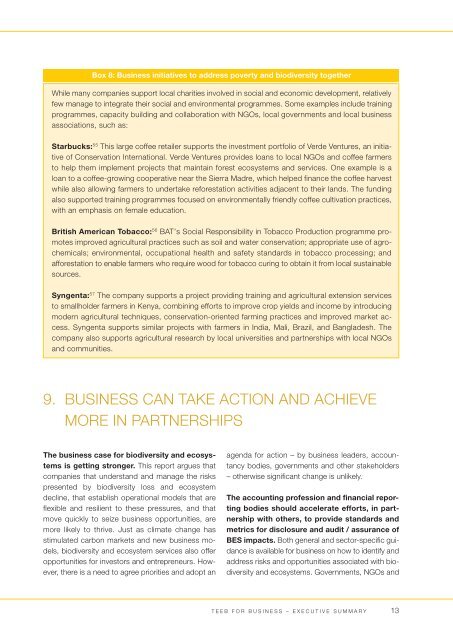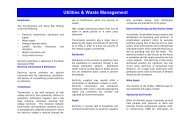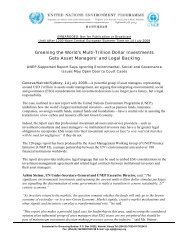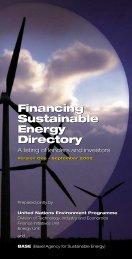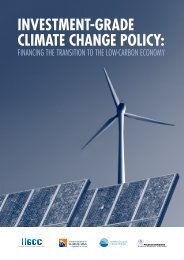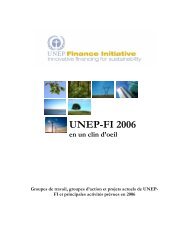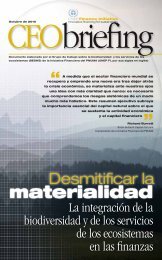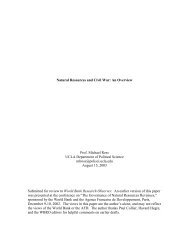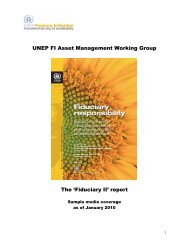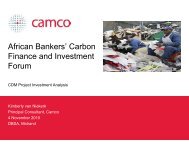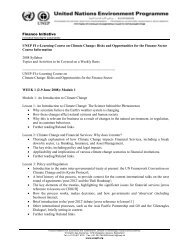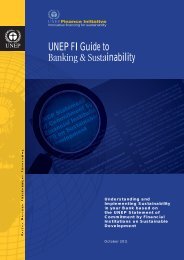for Business - TEEB
for Business - TEEB
for Business - TEEB
You also want an ePaper? Increase the reach of your titles
YUMPU automatically turns print PDFs into web optimized ePapers that Google loves.
Box 8: <strong>Business</strong> initiatives to address poverty and biodiversity together<br />
While many companies support local charities involved in social and economic development, relatively<br />
few manage to integrate their social and environmental programmes. Some examples include training<br />
programmes, capacity building and collaboration with NGOs, local governments and local business<br />
associations, such as:<br />
Starbucks: 55 This large coffee retailer supports the investment portfolio of Verde Ventures, an initiative<br />
of Conservation International. Verde Ventures provides loans to local NGOs and coffee farmers<br />
to help them implement projects that maintain <strong>for</strong>est ecosystems and services. One example is a<br />
loan to a coffee-growing cooperative near the Sierra Madre, which helped finance the coffee harvest<br />
while also allowing farmers to undertake re<strong>for</strong>estation activities adjacent to their lands. The funding<br />
also supported training programmes focused on environmentally friendly coffee cultivation practices,<br />
with an emphasis on female education.<br />
British American Tobacco: 56 BAT’s Social Responsibility in Tobacco Production programme promotes<br />
improved agricultural practices such as soil and water conservation; appropriate use of agrochemicals;<br />
environmental, occupational health and safety standards in tobacco processing; and<br />
af<strong>for</strong>estation to enable farmers who require wood <strong>for</strong> tobacco curing to obtain it from local sustainable<br />
sources.<br />
Syngenta: 57 The company supports a project providing training and agricultural extension services<br />
to smallholder farmers in Kenya, combining ef<strong>for</strong>ts to improve crop yields and income by introducing<br />
modern agricultural techniques, conservation-oriented farming practices and improved market access.<br />
Syngenta supports similar projects with farmers in India, Mali, Brazil, and Bangladesh. The<br />
company also supports agricultural research by local universities and partnerships with local NGOs<br />
and communities.<br />
9. BUSINESS CAN TAKE ACTION AND ACHIEVE<br />
MORE IN PARTNERSHIPS<br />
The business case <strong>for</strong> biodiversity and ecosystems<br />
is getting stronger. This report argues that<br />
companies that understand and manage the risks<br />
presented by biodiversity loss and ecosystem<br />
decline, that establish operational models that are<br />
flexible and resilient to these pressures, and that<br />
move quickly to seize business opportunities, are<br />
more likely to thrive. Just as climate change has<br />
stimulated carbon markets and new business models,<br />
biodiversity and ecosystem services also offer<br />
opportunities <strong>for</strong> investors and entrepreneurs. However,<br />
there is a need to agree priorities and adopt an<br />
agenda <strong>for</strong> action – by business leaders, accountancy<br />
bodies, governments and other stakeholders<br />
– otherwise significant change is unlikely.<br />
The accounting profession and financial reporting<br />
bodies should accelerate ef<strong>for</strong>ts, in partnership<br />
with others, to provide standards and<br />
metrics <strong>for</strong> disclosure and audit / assurance of<br />
BES impacts. Both general and sector-specific guidance<br />
is available <strong>for</strong> business on how to identify and<br />
address risks and opportunities associated with biodiversity<br />
and ecosystems. Governments, NGOs and<br />
T E E B F O R B U S I N E S S – E X E C U T I V E S U M M A R Y 13


